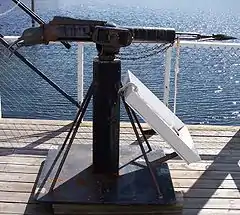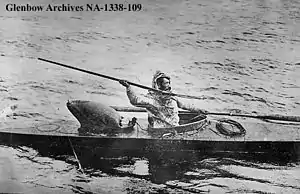魚叉
歷史

魚叉

現代捕鯨魚叉
用魚叉捕魚最早見於舊石器時代,當時之魚叉較今簡便許多,僅為竹竿或木杆帶不尖銳之鈍刺而成形[1]。位於法國南部最大商業港口馬賽附近的科斯奎洞穴(Cosquer Cave)於1985年被一名潛水夫意外發現,並在1991年出土了第一件壁畫。其中包含許多象徵魚叉之圖畫,年代超過16,000年之久。
在一些古老文獻中,可發現魚叉之影子,然皆不詳盡。其中於《聖經·約伯記》中,在耶和華與約伯的論辯中,即曾透露出那時已有用魚叉捕魚之習慣[2]。古希臘史學家波利比奧斯亦於其著作《歷史》(Ἱστορίαι)中記載著古代漁民,藉由魚叉尋找、捕殺箭魚之現象,當時之魚叉形式已然進步許多,其頭帶尖刺且可替換[3]。
現代發展
現今,捕鯨業將古代之魚叉加大連結厚重之長繩,並融合於加農砲技術,使其威力更為增強,獵殺鯨魚相對容易許多,此舉亦相對照成許多鯨魚如露脊鯨、藍鯨、長鬚鯨與大翅鯨之數量大幅減少,近年來澳大利亞、巴西等國政府也因此介入反對捕鯨。
相關條目
注釋
- Guthrie, Dale Guthrie (2005) The Nature of Paleolithic Art. (页面存档备份,存于) Page 298. University of Chicago Press. ISBN 0226311260
- 《聖經·約伯記41:7》:「你能用倒鉤槍扎滿他的皮、能用魚叉叉滿他的頭麼?」
- Polybius, "Fishing for Swordfish" (页面存档备份,存于), Histories Book 34.3 (Evelyn S. Shuckburgh, translator). London, New York: Macmillan, 1889. Reprint Bloomington, 1962.
- Edgerton 2003, page 74
參考文獻
- Information about Erik Eriksen based on The Discovery of King Karl Land, Spitsbergen, by Adolf Hoel, The Geographical Review Vol. XXV, No. 3, July, 1935, Pp. 476–478, American Geographical Society, Broadway AT 156th Street, New York" and Store norske leksikon, Aschehoug & Gyldendal (Great Norwegian Encyclopedia, last edition)
- F.R. Allchin in South Asian Archaeology 1975: Papers from the Third International Conference of the Association of South Asian Archaeologists in Western Europe, Held in Paris (December 1979) edited by J.E.van Lohuizen-de Leeuw. Brill Academic Publishers, Incorporated. Pages 106-118. ISBN 9004059962.
- Edgerton; et al. (2002). Indian and Oriental Arms and Armour. Courier Dover Publications. ISBN 0486422291.
- Ray, Himanshu Prabha (2003). The Archaeology of Seafaring in Ancient South Asia. Cambridge University Press. ISBN 0521011094.
外部連結
This article is issued from Wikipedia. The text is licensed under Creative Commons - Attribution - Sharealike. Additional terms may apply for the media files.
